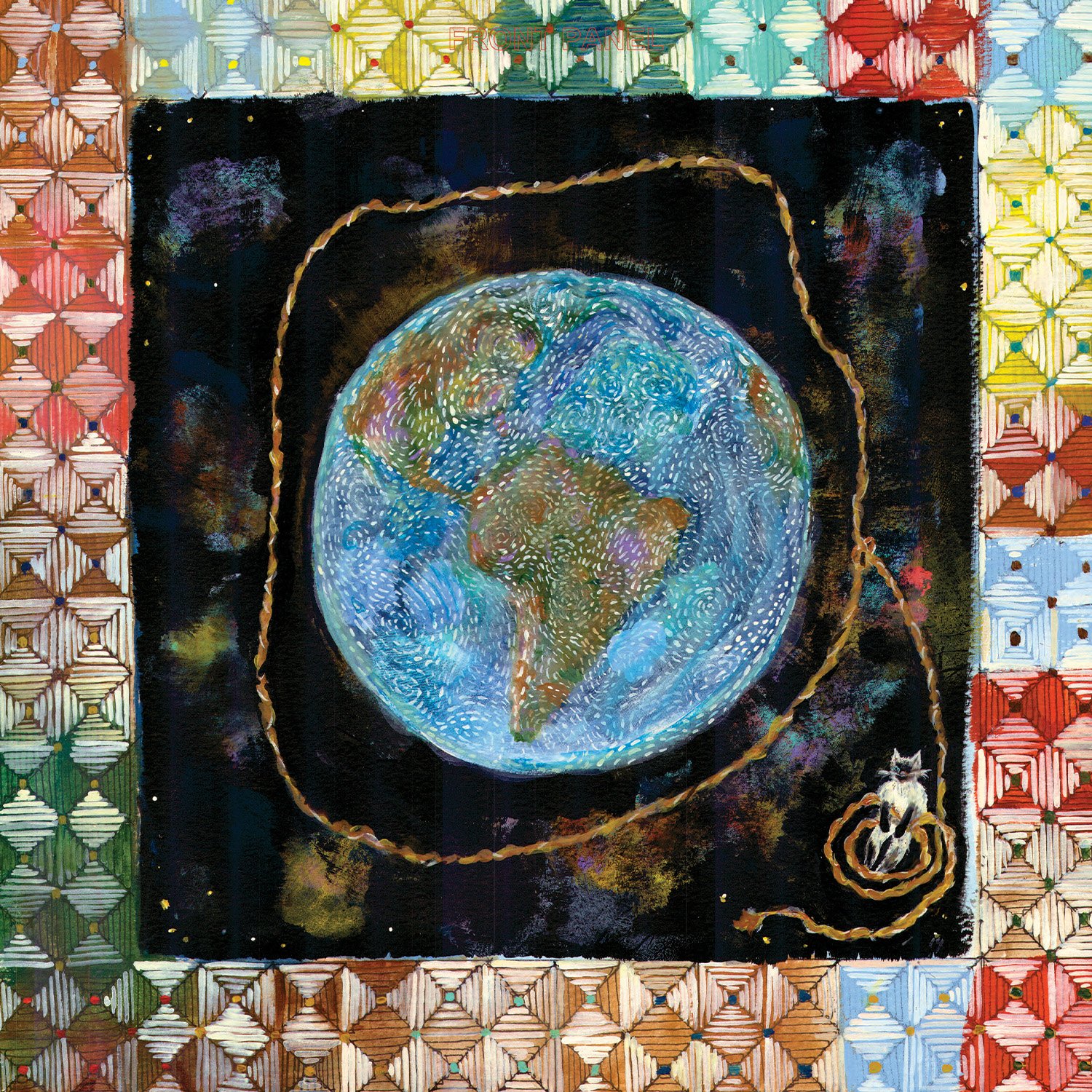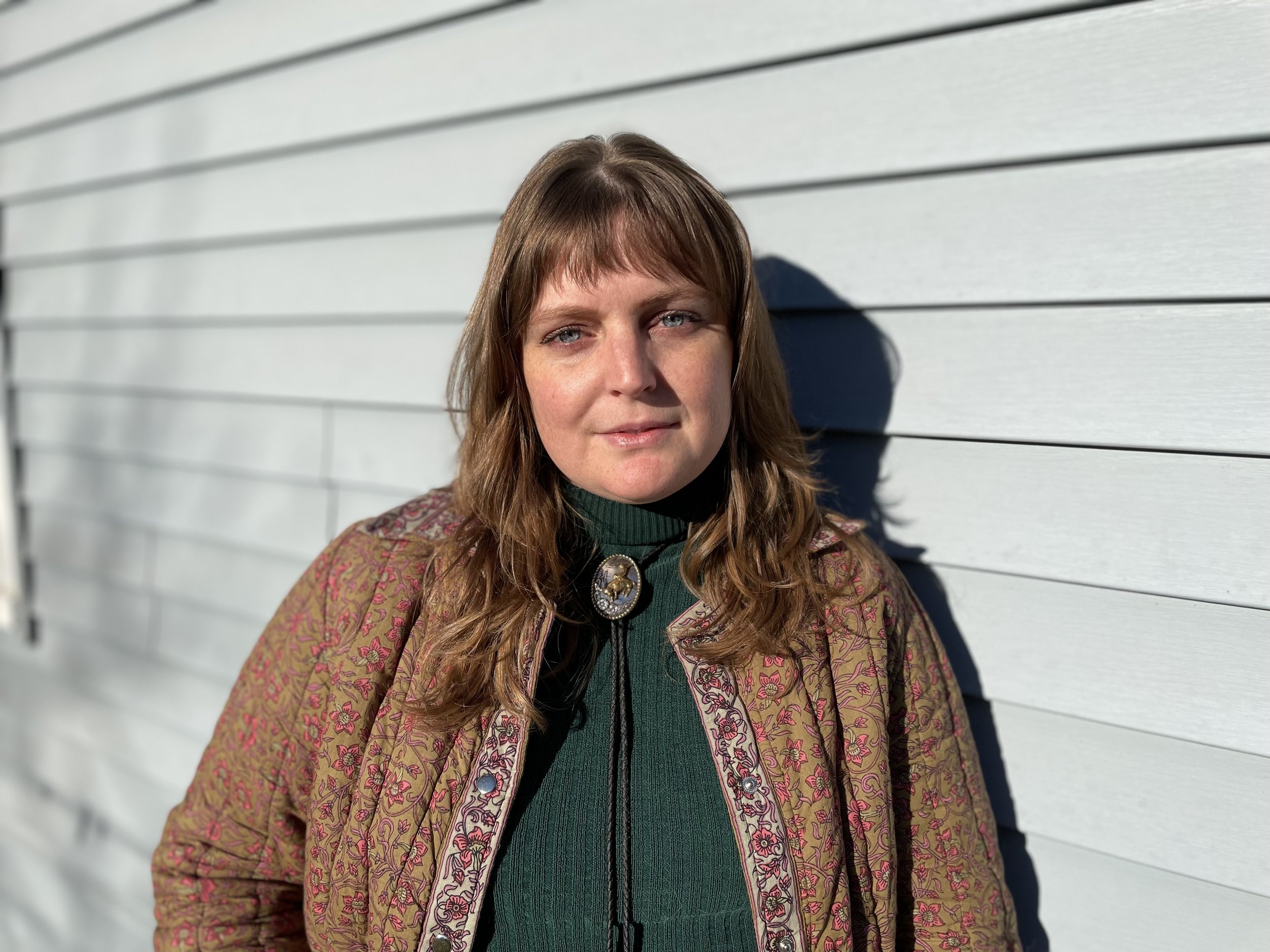Lou Turner - Microcosmos
What does it mean to be a traveler in a fixed place? An adventurer in domestic space? A troubadour in a confined microcosm, or a constellation of microcosms—that is, a microcosmos? These are the questions Nashville musician, songwriter, and published poet Lou Turner (aka Lauren Turner) was reflecting on as she wrote her luminous third solo album, Microcosmos. The spacious yet intimate cycle of cosmic country songs coalesce as her answer, demonstrating that to write a domestic epic requires finding the humor of a burp in the middle of a kiss, the smallest mercy in the gross but short month of February, the sacredness of saltines, the spiritual in the everyday. With her warm and welcoming voice and nylon-stringed acoustic guitar foregrounded over sparse yet playful arrangements, Microcosmos is a meditation on what it means to privilege cultivation over consumption and to ponder larger realities from within the shell of the fixed reality of a home. The reward is the adventure to be found in stillness and observation, the discovery of the otherworldly in earthly matter, the revelations of groundedness. Turner generously offers up these wonders to the listener, sharing hers, and inviting us to find our own.
Microcosmos, the follow-up to her celebrated 2020 album Songs for John Venn (SPINSTER), was co-produced by Turner and Ross Collier, and tracked live in the barn of a friends’ family farm in Alabama in May 2021 with Collier, Trevor Nikrant, and Joe Kenkel—all four members of Nashville’s resident weird rock collective, the Styrofoam Winos. The resulting sound has that tight-but-loose feeling that can only be achieved by a group of people who are completely comfortable with each other creatively, who can take risks with sounds of horns, coconuts, and pots and pans, while knowing when to pull back, keep it simple, and let Turner’s songs shine. The result feels akin to efforts by the Silver Jews or Lambchop (of which the bassist Matt Swanson appears on “Green and Growing”) or Bill Callahan’s more recent cosmic country records—warm and playful but not excessively ornamented, with the songwriter and her songs front and center.
As Lou Turner began to compile this collection of songs she had written at home or in the backyard during the pandemic months of 2020 and 2021, she joked that she was working on her “domestic troubadour record.” She was reading Bernadette Mayer’s feminist epic poem Midwinter Day, while listening to Joni Mitchell’s Hejira (which she calls “the ultimate road album”), as well as other 70s singer-songwriters—Jerry Jeff Walker, Neil Young, and Michael Hurley in particular. Turner says of Microcosmos: “Musically, these songs are mostly in the country/folk vein of the 70s songwriter but lyrically they’re challenging some of those tropes or totally subverting them altogether, talking about commitment and love—the small microcosmic things that make up the fabric of everything.” She was thinking about how on Hejira, Joni recontextualizes “the road” as a feminist space for solitude and self-confrontation, which as Turner notes, “a lot of the rambler-gamblers aren’t strong enough to do.” On Microcosmos, Turner’s home and mind are her road, as she finds magic in a friend’s rising bread dough, encounters a metaphor for love in pocket lint, and experiences the pitfalls of reticence in a relationship. She confides, “The smallest mercy/Is mercy enough for me/To keep me sticking around here/And waiting for another one.” In that spirit, Turner covers Simon Joyner’s “You Got Under My Skin,” which he refers to as an anti-troubadour song.
On the title song, “Microcosmos,” Turner lays out a central theme of the record and much of her writing in general, which she describes as, “investigating how big, spiritual ideas or meaning can be found in the infinitesimal.” Over ethereal psaltery pedal effects, warm and hypnotic upright bass, and acoustic guitar arpeggios, she sings, referencing Hamlet, “If I were bound in a nutshell of infinite space/That’s where we crackle in good grace and see face to face/We cut our context into pieces we can swallow/But something that melts was never hollow/But full of microcosmos.” The domestic troubadour has made her entrance.
In the lyrics of “What Might We Find There,” the most indie rock of the album’s tracks, Turner is honest about the difficulty in confronting the big picture, the danger of conceiving of yourself as a character in a linear storyline, rather than a flawed person living in the present. She writes, “Somewhere in the middle of the story/I refused to protagonize further/Right around the rising action I/Insisted I must be another/Kind of character one with a hat/Much rounder someone that uses a map/To see if it accommodates them.” There’s a hint of David Berman’s “Storyline Fever” here, an admission that she can’t climb the cosmic stairs to find some better version of herself, that she’s tired of analyzing her place in the world and just wants to live in it. It’s a subversive statement for a songwriter to make, a refusal to story herself beyond recognition, an acceptance of her limitations, and with that, a freedom in everyday reality.
On “Empty Tame and Ugly,” the spaghetti western-esque title of which was borrowed from a James Baldwin quote, Turner confronts most directly the masculine troubadour archetype who blows from town to town, eating and drinking and using everything up, leaving dust and tumbleweed in his wake, but nothing of beauty, substance, or endurance. The pedal steel and horns allude to Morricone, and Turner’s biting words rebuke the hollow commercialism of the Nashville establishment with its fake cowboys and cookie-cutter stories. “You got a big guitar/You got three old chords/but they don’t tell no truth/You have three chords that make your lasso/and their names are empty tame and ugly.” Though she minces no words, her delivery is more mournful than scathing—the vapidness of it all being the sad antithesis to Turner’s delightful, questioning alternative. On Microcosmos, Lou Turner puts forth the counter-concept of the domestic troubadour, and teaches us all how to become one in our respective microcosms—a seeker, a cultivator, she who makes meaning from all she encounters, from cosmic radios, to the cat’s scratches, to a bird nesting in the O of the VALERO sign.
Microcosmos was released September 2, 2022 on vinyl, CD, and digital platforms.
“Lou Turner is one of the most promising indie rock songwriters in Nashville right now to my ears. I also really love her voice, I love the inquisitiveness of the way she sings.”
Microcosmos Tracklist:
Side A
Microcosmos
Look Out Below
Green and Growing
Empty Tame and Ugly
Dancing to Hold Music
Side B
What Might We Find There
I’ve Got the O’s
You Got Under My Skin
Big Ole Head
Smallest Mercy
Hot Soup, Cold Bowl
Microcosmos was engineered, co-produced, mixed and mastered by Ross Collier and tracked live at The Farm in May 2021 (special thanks to the Parrott family). All songs by Lou Turner except “You Got Under My Skin” by Simon Joyner (Cowardly Traveller Music, BMI). “Empty, Tame and Ugly” borrows its name from a quote by James Baldwin. Lou Turner contributes voice, guitar, and percussion. Ross Collier plays guitar, percussion, therevox synth, psaltery, jaw harp, and sings background vocals. Trevor Nikrant contributes drums, electric bass, electric guitar, and trombone on “Empty Tame and Ugly.” Joe Kenkel plays upright bass and drums and trumpet on “Empty Tame and Ugly.” Rowen Merrill plays the string arrangement and violins on “I’ve Got the O’s.” Will Johnson contributes pedal steel guitar on “Empty Tame and Ugly,” “Look Out Below,” and “What Might We Find There.” Matt Swanson plays electric bass and wurlitzer on “Green & Growing.” Anson Hohne adds marimba on “Smallest Mercy” and “Microcosmos.” Sally Anne Morgan plays fiddle on “Big Ole Head,” and Michael Cormier contributes keys on “Dancing to Hold Music.” Artwork painting by Sarah Bachman. Layout by Rosali Middleman.
Photo by Trevor Nikrant


